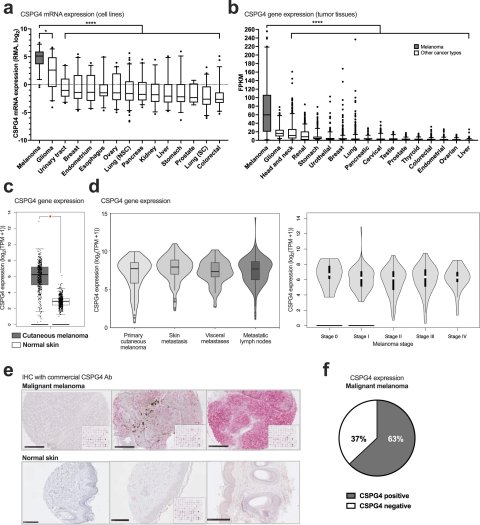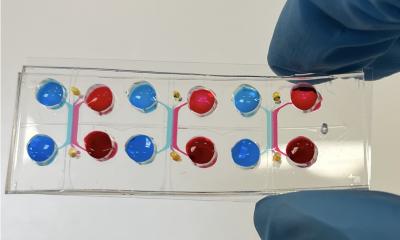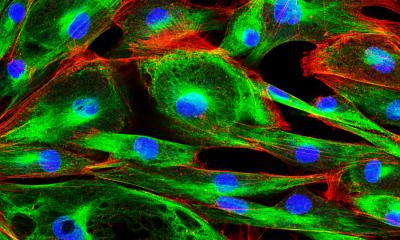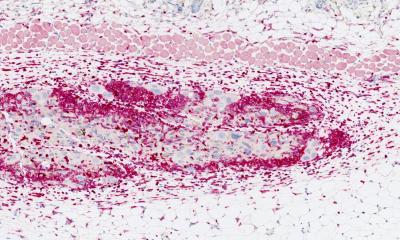
Image source: Adobe Stock/Анастасия Стягайло
News • Oncology & Immunology
Researchers find new IgE antibody targeting skin cancer
A new class of immunotherapy shows promising results for fighting the most aggressive form of skin cancer. A study by researchers from King's College London and Guy's and St Thomas' NHS Foundation Trust investigates whether a novel antibody can target and treat melanomas. The results show that the antibody activates the immune response to fight cancer and slows melanoma growth in mice.
New IgE antibody to target immune responses specifically towards melanoma cells
Malignant melanoma is the most aggressive type of skin cancer with poor survival rates for half of patients within five-years of diagnosis. Although there has been substantial progress in developing immunotherapies (drugs which stimulate the body's own natural defense system to attack cancer), many patients' tumors do not respond. This drug could benefit those patients with melanoma who do not respond to existing treatment.
Many existing immunotherapies used in cancer treatment belong to the antibody type called IgG. However, researchers at King's College London and Guy's and St Thomas' have developed an IgE antibody which can utilize the patient's own immune system to attack cancer in a different way.
Researchers developed an IgE antibody specific for a marker on the surface of human melanoma cells, called chondroitin sulfate proteoglycan 4 (CSPG4) found on up to 70% of melanomas. Immunotherapies currently available draw broadly upon the immune system's defenses, however this new antibody was designed to target immune responses specifically towards melanoma cells.
The researchers showed that CSPG4 IgE could attach to and activate immune cells found in melanoma patient blood to kill human melanoma cancer cells. CSPG4 IgE treatment slowed cancer growth in mice implanted with human immune cells, including cells from patients with melanoma. An allergy test conducted with patient blood found that CSPG4 IgE did not activate white blood cells called basophils, indicating that the therapy may be safe to take.
CSPG4 expression in malignant melanoma and normal tissues

a CSPG4 mRNA expression, derived from RNAseq data, across cell lines of different cancer cell types. n represents the number of cell lines (data from Cancer Cell Line Encyclopedia (CCLE), portals.broadinstitute.org/ccle, n = 56, n = 59, n = 26, n = 57, n = 28, n = 27, n = 48, n = 127, n = 41, n = 32, n = 26, n = 37, n = 8, n = 50, and n = 58, respectively) (p = 0.0156 and p ≤ 0.0001).
b CSPG4 gene expression in tissues across cancer types (data and images from Human Protein Atlas, v20.proteinatlas.org28, 29, n = 153, n = 499, n = 877, n = 354, n = 406, n = 1075, n = 994, n = 176, n = 291, n = 134, n = 494, n = 501, n = 597, n = 541, n = 373, and n = 365 samples, respectively per cancer type; p ≤ 0.0001).
c Comparison of CPSG4 gene expression between cutaneous melanoma and normal skin tissues (from GEPIA)67 (n = 461 and n = 558, respectively). TPM = transcripts per million.
d CPSG4 gene expression across primary cutaneous melanoma lesions, skin metastases, visceral metastases and metastatic lymph nodes (left; TCGA-SKCM data was obtained from xenabrowser.net68, n = 103, n = 116, n = 36, n = 208, respectively), and across disease stages of melanoma (right; from GEPIA67).
e Representative immunohistochemical (IHC) images of malignant melanoma samples showing low, intermediate, and high CSPG4 expression (pink staining, left to right) respectively, and normal skin tissue (showing no/low CSPG4 expression). Samples were stained with a commercially sourced anti-human CSPG4 antibody and CSPG4 expression was detected by alkaline phosphatase (AP; pink) staining. Nuclei were stained with hematoxylin (blue). Scale bar = 250 μm.
f Quantitative analyses of CSPG4 expression detected in human melanoma and non-malignant tissues by IHC: expression was detected in 63% of all melanoma tissues (n = 428). Boxes denote 25th to 75th percentile with median line. Whiskers mark the minima 5th percentile to the maxima 95th percentile. Data shown as mean ± SEM. Source data are provided as a Source Data file. Kruskal–Wallis (a, b, d left), One-way ANOVA (d right), Student’s t test (c): *p ≤ 0.05; ****p ≤ 0.0001.
Study findings
Our findings show that the human immune system reacts differently in the presence of drugs based on IgE antibodies and points to the potential of applying IgE to mount an effective response against melanoma.
Professor Sophia Karagiannis
Dr. Heather Bax, Postdoctoral Research Fellow from St. John's Institute of Dermatology, King's College London, said, "We have shown that an immune response can be triggered by IgE immunotherapy for melanoma and that this applies to human melanomas and to melanoma patient immune responses. Our findings replicate existing observations for MOv18 IgE, the first anti-cancer IgE, which targets ovarian cancer, and supports development of IgE therapies for other solid tumors".
Professor Sophia Karagiannis, from St. John's Institute of Dermatology, King's College London, said, "Four in ten people with advanced melanoma do not respond to available treatments. Our findings show that the human immune system reacts differently in the presence of drugs based on IgE antibodies and points to the potential of applying IgE to mount an effective response against melanoma. This opens up the possibility of this new class of drugs to benefit different patient groups and a new frontier in the battle against cancer."
Professor James Spicer, from King's College London and a Consultant at Guy's and St Thomas' NHS Foundation Trust, said, "We have recently completed the first ever trial testing an IgE therapy for cancer (MOv18 IgE), and are excited about the prospect of a whole new class of antibody drugs in oncology. The collaboration between the King's College London and Guy's and St Thomas' research groups is close and ever more productive."
The first IgE antibody (MOv18 IgE) generated at King's College London has been trialed for ovarian cancer with results expected to be published later in 2023. Epsilogen Ltd owns rights to both CSPG4 IgE and MOv18 IgE. Epsilogen was spun out from King's College London in 2017 and has attracted venture capital financing from multiple investors.
Source: King's College London
27.04.2023





